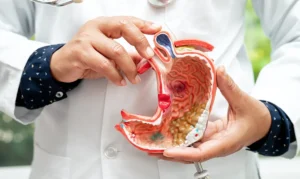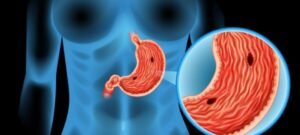Stomach Cancer Surgery in Delhi
Stomach cancer, also known as gastric cancer, occurs when abnormal cells form in the stomach lining and grow uncontrollably, creating a tumour. It can start in any part of the stomach, but most commonly begins in the mucosa, the innermost layer. Over time, the cancer may spread to other parts of the stomach, lymph nodes, and even distant organs like the liver, lungs, and bones.
Stomach cancer is the 5th most common cancer worldwide, affecting around 1,00,000 people annually.
This blog will explore the common symptoms of trigeminal neuralgia, offering insights into its causes and the latest treatment options.
Reach Out for Expert Care
How Does Stomach Cancer Usually Start?
Stomach cancer typically begins in the inner lining of the stomach (the mucosa), but how does it progress? It often starts slowly and spreads deeper into the stomach wall, reaching lymph nodes and other organs. Risk factors such as poor diet, chronic stomach inflammation, and infections like Helicobacter pylori can contribute to its development.
According to Dr. Deep Goel, a renowned surgical oncologist, “Early detection of stomach cancer can significantly improve treatment outcomes. Unfortunately, many patients come to us with advanced stages due to non-specific symptoms in the early stages.”
What are the Common Symptoms of Stomach Cancer?
Stomach cancer symptoms can often be subtle in the early stages and mistaken for minor digestive issues, which makes early detection challenging. Here’s a closer look at symptoms to watch for:
1. Persistent Abdominal Pain or Discomfort
This is one of the most common early symptoms of stomach cancer. The pain may be dull or persistent, usually in the upper abdomen. Many people might brush it off as indigestion or a stomach ulcer.
2. Unexplained Weight Loss
Rapid and unintentional weight loss is a red flag and a potential indicator of cancer, including stomach cancer. Patients may notice a decrease in appetite or feel full sooner than usual during meals.
3. Nausea and Vomiting
Chronic nausea or recurrent vomiting, especially if blood is present in the vomit, can be a symptom of stomach cancer. These symptoms may indicate that the tumour is causing an obstruction or irritation.
4. Difficulty Swallowing (Dysphagia)
Tumours in the upper part of the stomach, near the oesophagus, can make swallowing difficult or painful. This can be a serious sign of a tumour obstructing the passage of food.
5. Feeling Full After Small Meals
Known as early satiety, this feeling occurs when the stomach cannot expand as usual due to the presence of a tumour. It may lead to significant changes in eating habits and appetite.
6. Fatigue and Weakness
Chronic tiredness and lack of energy are common in advanced stomach cancer, often resulting from nutritional deficiencies due to reduced food intake or internal bleeding.
7. Bloating and Gas
Many people with stomach cancer experience bloating, especially after meals. This feeling of fullness can contribute to appetite loss and discomfort.
8. Blood in the Stool or Vomit
Blood may appear in the stool or vomit if the cancer is bleeding. Stools might look dark or tar-like due to digested blood, which can indicate internal bleeding from the stomach.
9. Indigestion or Heartburn
Persistent heartburn or indigestion is common in people with stomach cancer, although it’s often dismissed as a minor gastrointestinal issue.
10. Jaundice
In advanced cases where stomach cancer spreads to the liver, jaundice can occur. This condition causes yellowing of the skin and eyes due to a buildup of bilirubin in the blood.
11. Swelling or Fluid Buildup in the Abdomen (Ascites)
Ascites, or fluid buildup in the abdomen, can cause a visibly distended abdomen and discomfort. It is often associated with advanced stages of cancer, particularly if it has spread to other organs.
What Causes Stomach Cancer?
Several risk factors are linked to the disease, including:
- Diet: High intake of salty, smoked, or pickled foods can increase risk.
- Chronic stomach inflammation: Long-term inflammation, often from gastritis, may lead to cancer.
- Helicobacter pylori infection: This bacterium is a known cause of stomach ulcers and is linked to stomach cancer.
- Genetics: A family history of the disease raises your risk.
- Smoking and alcohol use: Both contribute to increased cancer risk.
As Dr. Deep Goel emphasises, “Lifestyle choices, particularly diet and smoking, play a significant role in the development of stomach cancer. Patients must be educated on how to reduce their risk by adopting healthier habits.”
What are the Stages of Stomach Cancer?
The cancer is divided into five main stages:
- Stage 0: Cancer cells are limited to the stomach’s inner lining.
- Stage I: The cancer has begun spreading to deeper layers or nearby lymph nodes.
- Stage II: The cancer invades further into the stomach wall and more lymph nodes.
- Stage III: The tumour affects all layers of the stomach and nearby organs.
- Stage IV: Cancer has spread to distant organs like the liver or lungs.
Understanding the stages helps guide treatment options and prognosis.
What Treatment Options are Available for Stomach Cancer?
The treatment strategy depends on the cancer’s stage and location and includes:
- Surgery: Removing part or all of the stomach.
- Chemotherapy: Shrinking tumours or killing cancer cells.
- Radiation therapy: Targeting cancer cells with high-energy rays.
- Targeted therapy: Attacking specific cancer cells while sparing healthy ones.
- Immunotherapy: Using the body’s immune system to fight cancer.
The earlier the diagnosis, the better the treatment outcomes.
One patient who was successfully treated for advanced stomach cancer expressed their heartfelt gratitude: “I was terrified when I first heard my diagnosis, but thanks to Dr. Goel and his team, I’m now cancer-free. I owe my life to their expertise and care.”
How Does Diet Affect Stomach Cancer Risk?
Diet can significantly influence the risk of developing stomach cancer. A high intake of salty, smoked, and processed foods increases the risk, while a diet rich in fresh fruits and vegetables can help lower it. Limiting alcohol consumption and quitting smoking also play crucial roles in prevention.
Reach Out for Expert Care
Final Thoughts
Awareness of stomach cancer symptoms, causes, and the role of diet is key to early detection and prevention. Stomach cancer often goes unnoticed in its early stages, which is why paying attention to persistent symptoms like stomach pain, unexplained weight loss, or difficulty swallowing is crucial. Risk factors such as poor diet, smoking, and Helicobacter pylori infection contribute to its development, but lifestyle modifications can help reduce your risk.
Related Blogs

How to Prevent Stomach Cancer from Coming Back?
Surviving stomach cancer is an incredible achievement, one that marks the end of a difficult…
Read Article →
Top 10 Possible Warning Signs of Stomach Cancer: Don’t Ignore These
Stomach cancer, also known as gastric cancer, is one of the most common cancers worldwide.…
Read Article →